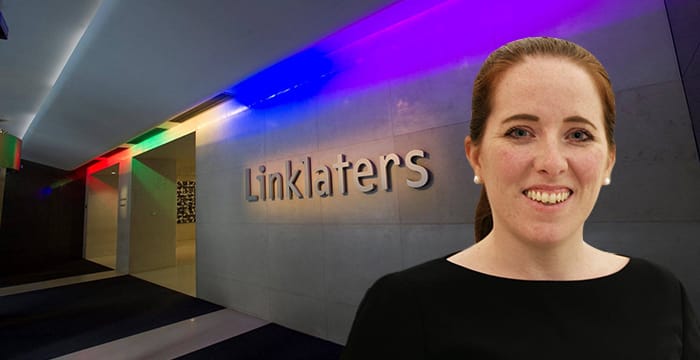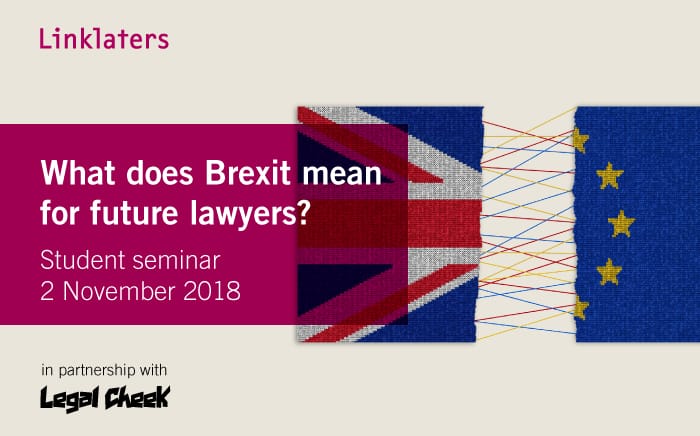Finn Griggs advises students to focus on the many positives emanating from the coming together of finance and technology during this ‘time of change’

Brexit chaos reigns. What shape will the deal take? How will it affect trade? Finance? Jobs and recruitment? Enforcement of court judgments? Who knows? Civil servants have described preparing for Brexit as “like playing chess in 4D”. The two main political parties appear divided and confused. So, how are the lawyers doing (after all, it’s their job to explain to their clients how exactly it’s all going to work?) And what does Brexit mean for the current cohort of law graduates?
Thankfully, Finn (Fionnghuala) Griggs, Linklaters partner and global co-head of fintech, is on hand to strike a note of reassurance.
“It is a live process,” she says. “There are, of course, uncertainties and that will continue until we know what the deal looks like. As lawyers we help our clients plan for the worst, hope for the best and prepare for what we do know will happen. We can’t know exactly what will happen but we can ask ourselves, ‘what can I manage today?’”
How worried is the business world? “Brexit is certainly a concern for clients, because there is so much focus on it and it is in the headlines every day. It is not their dominant concern, however, because there are a lot of other things happening and our clients are internationally focused, global businesses. It is not their main issue but it certainly can’t be ignored.”
Much of Linklaters’ work on Brexit to date has concerned the impact on financial regulation, a key issue for the firm’s many banking, fund manager and financial institution clients. The firm’s advice has covered a broad range of areas, however, including how Brexit will affect competition law, data protection and cross-border mergers.
“We have also been reiterating the point that some things won’t change,” says Finn. “For example, English contract law will stay the same.”
For the current cohort of graduates, the uncertainties can be daunting. What does their future hold?
“In terms of preparing for your career you don’t need to worry about the uncertainties because everyone is in the same position,” says Finn. “I would advise graduates to remain abreast of the key developments, partly because it will be a hot topic during the recruitment rounds, and also because it’s what clients are thinking about — as a lawyer you should always align yourself with your clients’ concerns.”
Finn emphasises that there will still be a place in the UK post-Brexit for lawyers who understand EU law. For a start, the EU rules will be embedded in our legislation — the government’s intention is to preserve EU law where it stands at the moment before the UK leaves, through the EU (Withdrawal) Act 2018. Second, Linklaters has international, outward-facing clients who are focused on cross-border transactions including in the EU and will need people who can advise on that.
“If I was graduating today, I would think there are a lot of positives to take,” she says. “This is a time of change and therefore an interesting time to be a lawyer. As a lawyer you are always focused on your client and you want to be involved in helping your client through change.”
Finn, who studied law at Cambridge University, has specialised in M&A (mergers & acquisitions) since joining Linklaters in March 2007. “I didn’t know I was going to be a corporate lawyer,” she says. “I took a broad approach, studying human rights and competition law. Then I did a vacation scheme at Linklaters and my traineeship here, and I quickly realised I enjoyed M&A law.”
In 2016, she was named one of Management Today’s 35 Women Under 35, and is, of course, a partner at one of the largest law firms in the world and global co-head of fintech. Her secret to success is that she likes what she does. “I’ve been fortunate in that I have a job I really enjoy and work with people who make the job really enjoyable. That has been key to me. I always like coming in to the office to do the job, and I’m working on interesting transactions with clients.”
Finn also has advice for anyone interested in fintech (the disruptive, potentially revolutionary business of technology-enabled financial services). It’s an exciting, fast-moving sector. Moreover, London is a global fintech hub and Finn thinks this will continue post-Brexit. She suggests that people find out as much information as they can in advance and, as they go through the interview process, bear in mind how firms approach it. “At Linklaters, it is seen as an important and exciting area of practice,” she says. There is no need to specialise in banking law first. “One of the things about fintech is it’s very cross-practice so it involves capital markets, competition… a whole range of areas,” says Finn. “There are lots of different routes in. I would advise people to keep an open mind about what they want to do.”
Finn Griggs will be speaking alongside other Linklaters lawyers at this Friday’s ‘What does Brexit mean for future lawyers?’ event, which is now fully booked.

About Legal Cheek Careers posts.



